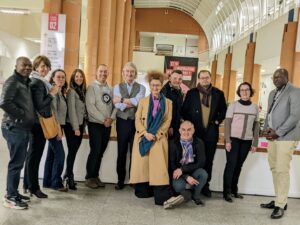INTERDISCIPLINARY RESEARCH ROUNDTABLE
administrator | Posted on |

November 8, 2022, welcomed a full seminar with speaker Peter McKiernan who shared great insight on making business and management research freer and more responsible. McKiernan spoke in great detail on researchers’ social and epistemic duty to produce good science.McKiernan emphasised factual but unwelcomed purposeful and unpurposeful outcomes of research. One fact underlined why researchers have sold their rights to journals and handed them the power to rank their intellectual property, which should not be the case.
Again, a relevant question was raised regarding who should rank academic writing. Students, some professors said softly. Why? Because they are mostly the consumers of the research papers.Journals now call the shots and institute so many revisions that researchers can barely recognise their manuscript when it is officially published— in high-ranked journals, to be precise.
Consequently, breakthrough research is hardly found in top-tier journals if not available in lower-ranked ones. Academics allow journals to make money off them, the speaker said.Should we say journals call the tune because they pay the piper?Should we say they call the tune because some journals contact distinguished researchers and offer them ready money in exchange for a paper they believe would hold a relevant topic? What do we need to do as an academic community? These and many other questions were concerns of the speaker and many who were present.
Once more, McKiernan acknowledged that many young and budding researchers would not dare rise against these ambassadors, lest their careers are ended over a phone call. Where are our patriotic senior researchers who can challenge the status quo?
Another highlighted fundamental truth focused on why management researchers are the consumers of management papers. Why aren’t practitioners eager to consume articles produced by researchers in the field? This has been an ongoing conversation for many years. Several researchers, such as Jean Marie Bartunek have written books and articles about the paradoxes of the academic-practitioner relationship. Yet, researchers appeared to be the primary consumers of these works that addressed issues concerning two categories of people- academics and practitioners.
There have been many attempts, if not to bridge this gap per se, to reduce these tensions and foster collaborative work between academics and practitioners.
To say that the solutions to the concerns raised would be developed in a few years would be maybe a lie. But, the cooperative efforts of practitioners and researchers at all levels can be the path that consumes all weaknesses that hinder unrestricted and more responsible research.

Leave a Reply